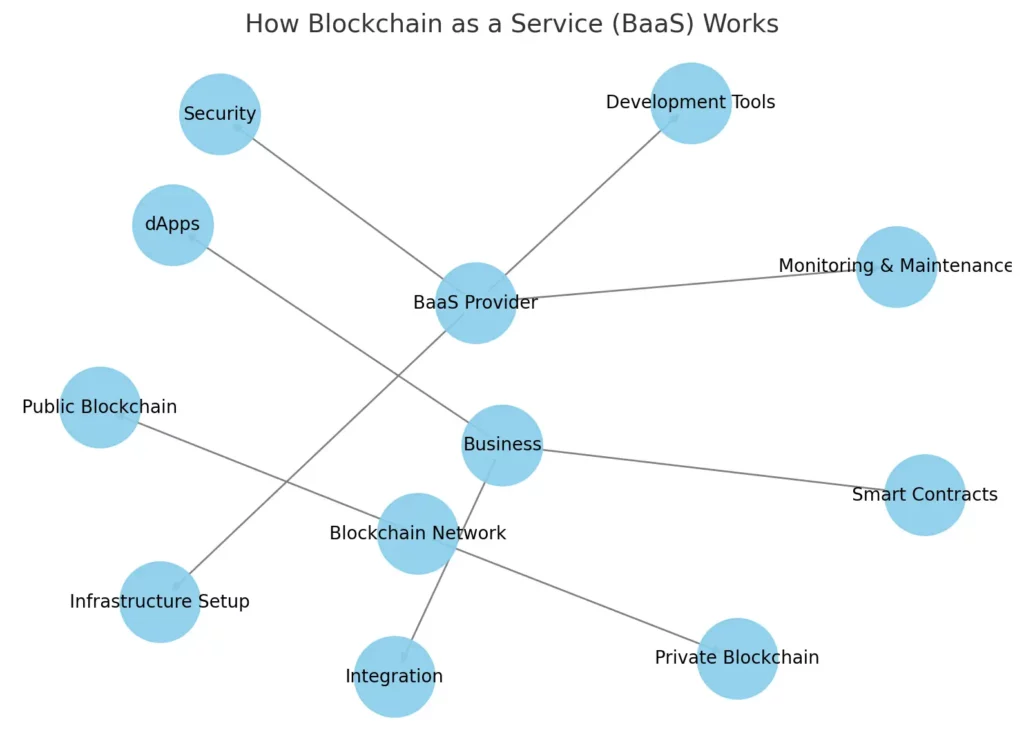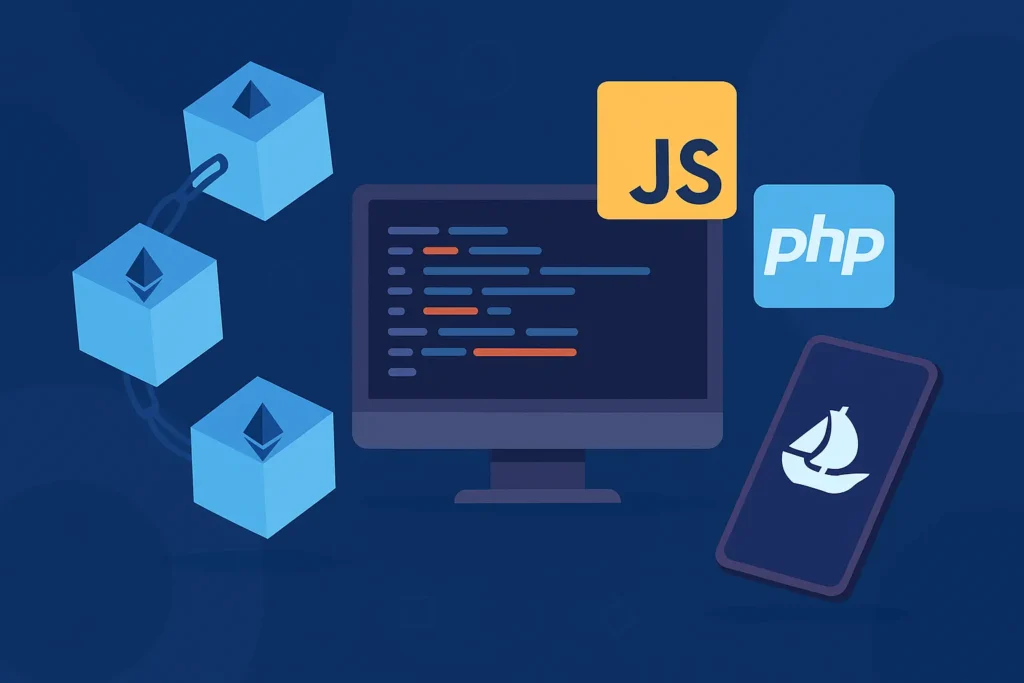Blockchain technology is transforming how businesses operate across industries, offering secure, decentralized, and scalable solutions. Blockchain as a Service (BaaS) is a cloud-based solution that allows companies to leverage blockchain without needing to build and maintain their infrastructure. This guide explores the potential of BaaS for businesses in 2024, detailing how it can be integrated and the benefits it offers.
What is Blockchain as a Service (BaaS)?
Blockchain as a Service (BaaS) is a cloud-based solution where external providers offer infrastructure, development tools, and management for blockchain applications. Like SaaS (Software as a Service), BaaS allows businesses to use blockchain without building and maintaining their own distributed ledger technology (DLT). Popular BaaS providers include Microsoft Azure, IBM Blockchain, and Amazon Web Services (AWS), which deliver customizable platforms to develop decentralized applications (dApps), smart contracts, and enterprise blockchain solutions.
Why Blockchain Matters for Businesses
Blockchain technology revolutionizes data integrity, security, and transparency. By using distributed ledger technology (DLT), blockchain ensures that records are immutable, encrypted, and auditable. It’s particularly beneficial for industries that deal with sensitive data, such as finance, healthcare, and supply chain management. As enterprise blockchain solutions become more accessible through BaaS, businesses can focus on innovation while providers handle the complexity of blockchain infrastructure.
How Blockchain as a Service (BaaS) Works

Blockchain as a Service (BaaS) operates similarly to other “as a service” models like Software as a Service (SaaS). It allows businesses to utilize blockchain technology without the need to build, maintain, or manage the backend infrastructure. BaaS providers take care of the complexities of setting up blockchain networks, allowing businesses to focus on application development, business logic, and deploying solutions. Here’s how it works:
1. Infrastructure Setup
When a business subscribes to a BaaS provider, the provider sets up the blockchain infrastructure, which includes:
- Blockchain network configuration: Deploying the blockchain nodes (servers) required to create a decentralized environment.
- Consensus algorithms: Implementing the necessary algorithms (e.g., Proof of Stake, Practical Byzantine Fault Tolerance) to validate transactions and ensure security.
- Hosting: Typically, BaaS is hosted on cloud infrastructure, meaning the blockchain platform is available online with minimal latency and high availability.
2. Development Environment
After the blockchain infrastructure is set up, businesses get access to a development environment where they can:
- Develop Smart Contracts: BaaS platforms often include tools and templates to develop, test, and deploy smart contracts.
- Build dApps: Developers can build decentralized applications (dApps) using APIs and SDKs provided by the BaaS platform.
- Customize Blockchain: Depending on the provider, businesses can customize the blockchain parameters (public vs private, permissions, etc.).
3. Monitoring and Management
The BaaS provider takes care of ongoing maintenance, ensuring the blockchain network runs efficiently:
- Monitoring: Real-time monitoring tools are provided to track the performance, transactions, and security of the blockchain network.
- Security: BaaS platforms handle data encryption, identity management, and access control to ensure the blockchain is secure from unauthorized users.
- Scaling: As your blockchain application grows, BaaS providers can automatically scale the infrastructure, ensuring performance is maintained even with increased transaction loads.
4. Integration
Businesses can integrate BaaS with existing legacy systems and databases using APIs. BaaS providers often offer pre-built connectors for various business applications (CRM, ERP) to ensure seamless integration of blockchain solutions within the company’s ecosystem.
In short, BaaS providers act as a middleman, offering blockchain infrastructure, development tools, and management services so businesses can leverage blockchain technology without having to deal with the complexity of maintaining it themselves.
Learn More: Budgeting a Blockchain Launchpad App: Complete Guide 2025
| Component | Description | Role in BaaS |
|---|---|---|
| Infrastructure Setup | Cloud-based blockchain nodes and network configuration. | Provides the foundation for deploying blockchain applications without in-house infrastructure management. |
| Development Environment | Tools for creating smart contracts, APIs, and decentralized applications (dApps). | Simplifies app development and integration with blockchain. |
| Monitoring & Management | Real-time tracking, performance management, and security updates provided by the BaaS provider. | Ensures blockchain networks are secure and scalable, without requiring ongoing technical maintenance. |
| Integration | APIs and connectors for integrating blockchain with existing systems (e.g., ERP, CRM). | Allows businesses to integrate blockchain into legacy systems and existing applications seamlessly. |
Key Features of Blockchain as a Service (BaaS)
Businesses looking to leverage blockchain technology will find the following key features with BaaS:
- Blockchain Infrastructure Management BaaS providers handle infrastructure setup and management, including network configuration, node deployment, and storage. This cloud-based approach ensures businesses can deploy blockchain applications without in-house technical expertise in blockchain infrastructure.
- Smart Contracts BaaS platforms offer tools for creating, deploying, and managing smart contracts, which automate agreements and reduce the need for intermediaries. This feature is critical for businesses looking to streamline operations and ensure compliance.
- Public vs Private Blockchain Depending on the use case, businesses can choose between public blockchain (open to anyone) and private blockchain (restricted access). BaaS allows companies to build either type of blockchain network, providing flexibility in how they use decentralized technology.
- Security and Scalability Security is a top priority with BaaS, featuring encrypted data storage, identity management, and role-based access control. Blockchain scalability is also managed by BaaS providers, ensuring that the network can grow with the business without sacrificing performance or security.
- Blockchain Development Tools Most BaaS platforms offer comprehensive blockchain development tools, including APIs, SDKs, and integrated environments for building and testing decentralized applications (dApps). These tools simplify blockchain app development, enabling faster time-to-market for innovative solutions.

Technical Breakdown of Blockchain Components
Understanding the core components of blockchain technology can help you make informed decisions when implementing BaaS solutions. Here’s a technical breakdown of some of the most critical elements:
a. Smart Contracts
Smart contracts are self-executing contracts with the terms of the agreement directly written into code. They automatically enforce the conditions set between parties without intermediaries. This feature is crucial for automating processes in industries such as finance, insurance, and logistics. When deploying smart contracts on a Blockchain as a Service platform, businesses gain the benefit of pre-built templates and development environments that reduce the complexity of coding and deploying contracts.
b. Consensus Mechanisms
Blockchain networks rely on consensus mechanisms to validate transactions and ensure security. The most common mechanisms are:
- Proof of Work (PoW): Used by public blockchains like Bitcoin, where miners solve complex puzzles to validate transactions.
- Proof of Stake (PoS): A more energy-efficient method where validators are chosen based on the number of coins they hold and are willing to “stake.”
- Practical Byzantine Fault Tolerance (PBFT): Common in private blockchain networks, this mechanism is faster and more efficient for enterprise use cases.
BaaS platforms often allow businesses to choose between different consensus mechanisms based on their performance and security needs.
c. Distributed Ledger Technology (DLT)
Distributed Ledger Technology (DLT) is the backbone of blockchain, ensuring that data is stored across multiple nodes instead of in a single location. This decentralized model provides enhanced security, as altering the data on one node does not affect the others. Public vs private blockchain models differ in how this data is managed, with public ledgers being open to everyone and private ledgers being accessible only to authorized participants.
How Businesses Are Using Blockchain as a Service (BaaS)
Many industries are adopting BaaS for its efficiency, security, and transparency. Here are some ways blockchain integration in business is reshaping operations:
- Supply Chain Management: Companies are using blockchain to track products from production to delivery, ensuring transparency and reducing fraud.
- Financial Services: Blockchain enables secure, fast transactions without intermediaries, reducing costs and increasing trust in payment systems.
- Healthcare: Patient records are securely stored and shared on blockchain networks, allowing for better collaboration between healthcare providers while safeguarding privacy.
BaaS platforms enable businesses to deploy these solutions without the heavy burden of managing blockchain infrastructure. Moreover, Hyperledger frameworks, available on many BaaS platforms, allow businesses to build permissioned blockchain solutions that align with regulatory requirements.
Challenges of BaaS and How to Overcome Them
While Blockchain as a Service offers numerous benefits, businesses should be aware of potential challenges that can arise during implementation. Here are some of the key challenges and strategies to overcome them:
a. Blockchain Scalability
One of the primary concerns with blockchain technology, particularly in public blockchain networks, is scalability. As more transactions are added, the network can become slower and less efficient. Private blockchain solutions tend to scale better since they have fewer participants and transactions. To overcome this challenge, businesses can:
- Use Layer 2 solutions that handle transactions off the main blockchain and then report back.
- Choose a BaaS provider that offers high-performance, scalable infrastructure, such as AWS or Microsoft Azure, which supports faster processing and larger workloads.
b. Integration with Legacy Systems
Integrating blockchain technology with existing IT infrastructure can be challenging, especially for industries that rely on legacy systems. BaaS providers offer blockchain development tools that simplify integration, but businesses still need to ensure compatibility and smooth data migration. To address this, it’s important to:
- Choose BaaS platforms that offer APIs and pre-built connectors for legacy systems.
- Partner with experts in blockchain integration to ensure smooth implementation and minimal disruption.
c. Regulatory and Compliance Issues
Blockchain operates in a complex regulatory environment, especially in industries like finance and healthcare. Compliance with data privacy regulations, such as GDPR, can be difficult when dealing with decentralized networks. To mitigate this:
- Use private blockchain solutions where access can be restricted and regulated.
- Opt for BaaS providers like IBM Blockchain or Oracle that offer built-in compliance features and audit trails.
Learn More: Top Blockchain Use Cases in 2025: Platforms & Applications
Challenge | Description | Solution |
|---|---|---|
| Scalability | Public blockchains may slow down as transaction volumes increase. | Use Layer 2 solutions, choose BaaS providers that offer scalable infrastructure, or opt for private blockchains. |
| Integration with Legacy Systems | Difficulties in integrating blockchain with existing IT systems. | Use APIs and pre-built connectors provided by BaaS platforms; partner with experts in blockchain integration. |
| Regulatory and Compliance | Complex regulatory landscape, especially in finance and healthcare sectors. | Opt for private blockchain solutions with access controls; choose BaaS providers with built-in compliance features. |
To ensure that your blockchain network is secure, it’s essential to follow industry-standard best practices. You can explore more about blockchain security in this detailed Blockchain Security Guide.
Here are some of the top challenges in Blockchain as a Service (BaaS) that businesses may face:
1. Scalability Issues
- Challenge: Public blockchains can slow down as transaction volumes increase, leading to scalability concerns. Network congestion, high fees, and longer transaction times are common issues, especially for applications requiring high throughput.
- Solution: Many BaaS providers offer Layer 2 scaling solutions, such as sidechains or off-chain processing, to improve transaction speeds. Opting for private blockchains or hybrid solutions can also address scalability.
2. Security Concerns
- Challenge: Blockchain technology itself is secure, but integrating it with existing systems can expose vulnerabilities. Ensuring secure key management, identity authentication, and data protection on the blockchain is critical.
- Solution: Implement best practices for encryption, access control, and multi-factor authentication. BaaS providers often offer integrated security features, but businesses need to monitor and maintain these rigorously.
3. Integration with Legacy Systems
- Challenge: Many businesses rely on legacy systems that may not easily integrate with modern blockchain platforms. Migrating existing data and processes to a blockchain framework can be complex and costly.
- Solution: BaaS providers typically offer APIs and tools for seamless integration. However, businesses may require custom development and consultation services to ensure smooth transitions.
4. Compliance and Regulatory Hurdles
- Challenge: Blockchain operates in a decentralized and often anonymous environment, which can conflict with regulatory requirements like GDPR, HIPAA, and KYC/AML laws. These regulations can be particularly tricky for industries like finance and healthcare.
- Solution: Private and permissioned blockchains offer better control and compliance. Some BaaS providers also include compliance-ready features, such as data audit trails, identity management, and permission settings.
5. Cost and Resource Management
- Challenge: Although BaaS reduces the complexity of blockchain development, the ongoing costs for cloud hosting, transaction fees, development, and scalability can add up, especially for smaller enterprises.
- Solution: Careful planning around the scope and scale of the project can help manage costs. Selecting the right BaaS provider with transparent pricing models can prevent cost overruns.
6. Lack of Skilled Professionals
- Challenge: Implementing blockchain solutions requires expertise in both blockchain technology and the industry-specific use case. The shortage of skilled blockchain developers and consultants can delay projects.
- Solution: Businesses can mitigate this by leveraging the tools and resources provided by BaaS platforms, which simplify many aspects of blockchain development. However, training or hiring specialized staff may still be necessary for large-scale implementations.
7. Interoperability
- Challenge: Many blockchain networks are isolated and unable to communicate with each other, making it difficult to transfer assets or data between different platforms.
- Solution: Some BaaS platforms are working on solutions for interoperability, using cross-chain bridges and standards like Hyperledger. Businesses need to assess their provider’s capabilities in this area.
These challenges, while significant, can be mitigated through the right choice of BaaS provider, proper planning, and expert consultation. As blockchain technology matures, many of these issues are expected to become more manageable.
Private Blockchains to rescue scaling in BaaS
Private blockchains in Blockchain as a Service (BaaS) can scale in several ways, allowing businesses to manage increasing transaction volumes and network demands while maintaining performance and security. Here are some key factors and methods through which private blockchains scale in BaaS environments:
1. Optimized Consensus Mechanisms
- Challenge: Traditional consensus mechanisms, like Proof of Work (PoW), are resource-intensive and slow for scaling, especially in public blockchains.
- Solution: Private blockchains typically use more efficient consensus mechanisms such as Proof of Stake (PoS), Practical Byzantine Fault Tolerance (PBFT), or Raft. These mechanisms require fewer participants to validate transactions, speeding up consensus and improving overall scalability without sacrificing security.
- Example: Hyperledger Fabric, commonly used in private BaaS implementations, uses PBFT to achieve faster consensus compared to public blockchains.
2. Permissioned Access Control
- Challenge: Public blockchains require all nodes to validate transactions, which can slow down the network as the number of participants grows.
- Solution: In a private blockchain, only a set of trusted nodes (permissioned participants) are allowed to validate transactions. This controlled access reduces the number of nodes involved in consensus, allowing for faster transaction processing, which is key for scalability.
- Example: In industries like supply chain or finance, only authorized stakeholders are allowed to participate in the network, reducing bottlenecks and speeding up transaction times.
3. Sharding and Partitioning
- Challenge: Managing large data volumes and numerous transactions can strain blockchain performance as the network grows.
- Solution: Private blockchains can employ sharding or partitioning techniques to split the blockchain ledger into smaller, more manageable pieces. Each shard processes a subset of the network’s transactions, which can be verified independently, improving transaction throughput without overwhelming the entire network.
- Example: Some enterprise BaaS platforms implement sharding techniques to divide the workload across multiple nodes, which improves performance as the network expands.
4. Parallel Processing
- Challenge: Blockchain networks often process transactions sequentially, creating bottlenecks.
- Solution: In private blockchains, BaaS providers can enable parallel transaction processing, where multiple transactions are handled simultaneously by different nodes. This reduces latency and accelerates transaction times as the network scales.
- Example: Using parallel processing techniques, BaaS providers such as Microsoft Azure or IBM Blockchain can manage high transaction volumes without slowing down the network.
5. Vertical and Horizontal Scaling
- Vertical Scaling: Increases the capacity of individual nodes by adding more processing power, memory, or storage.
- Horizontal Scaling: Adds more nodes to the network to distribute the transaction load across multiple participants.
- Example: A private blockchain in BaaS can be vertically scaled by upgrading the cloud infrastructure to handle larger transaction sizes or horizontally scaled by adding new nodes to manage more transactions simultaneously. Most BaaS providers, such as AWS or Microsoft Azure, offer both scaling options.
6. Sidechains and Layer 2 Solutions
- Challenge: Handling a large number of transactions directly on the blockchain can lead to slower processing and higher costs.
- Solution: Private blockchains can utilize sidechains or Layer 2 solutions that process transactions off-chain and then report back to the main blockchain. This reduces the strain on the main network and allows for greater scalability.
- Example: For high-frequency, low-value transactions, a sidechain can handle these operations and periodically reconcile with the main private blockchain. This approach is especially useful in industries like finance or logistics, where a high volume of transactions needs to be processed quickly.
7. BaaS-Managed Resource Allocation
- Challenge: As private blockchains scale, managing resources efficiently becomes more complex.
- Solution: In BaaS environments, resource allocation—such as storage, compute power, and bandwidth—is managed dynamically. BaaS providers monitor network activity and automatically allocate additional resources when needed, ensuring that the blockchain network continues to operate smoothly even as it scales.
- Example: AWS and Microsoft Azure offer auto-scaling features, which automatically adjust resources based on network activity, allowing private blockchains to handle increased loads seamlessly.
Summary of How Private Blockchains Scale in BaaS:
- Efficient Consensus: Use of fast, low-resource consensus mechanisms like PBFT or PoS.
- Permissioned Networks: Only a limited set of authorized nodes are involved, leading to faster processing.
- Sharding and Parallel Processing: These methods help divide the workload, allowing for multiple transactions to be processed simultaneously.
- Vertical and Horizontal Scaling: Adding more powerful nodes or increasing the number of nodes to handle larger workloads.
- Sidechains and Layer 2 Solutions: Off-chain processing that reduces the strain on the main blockchain network.
By leveraging these scalability methods, private blockchains in BaaS can handle increased transaction volumes, maintain security, and meet the growing demands of enterprises without compromising performance.
Choosing the Right BaaS Provider
Selecting a BaaS provider is crucial to the success of blockchain projects. Here’s what to look for when evaluating BaaS providers:
- Cloud-Based Blockchain Solutions: Ensure the provider offers flexible cloud infrastructure that can scale with your needs.
- Blockchain Security: Robust security protocols should include encryption, secure identity management, and disaster recovery plans.
- Support for Enterprise Blockchain Solutions: The provider should offer industry-specific blockchain platforms, such as those focused on finance, healthcare, or supply chain management.
- Development Tools: Look for integrated development environments and APIs that enable seamless development of smart contracts and dApps.
- Public vs Private Blockchain: The ability to support both types of blockchain networks is critical for businesses with diverse needs.
Popular providers in 2024 include:
- IBM Blockchain: Known for its enterprise blockchain solutions with robust security and flexibility for various industries.
- Microsoft Azure: Offers easy-to-use blockchain development tools and integration with other cloud services.
- Amazon Web Services (AWS): AWS provides a highly scalable platform with flexible pricing models, ideal for both small and large businesses.
IBM Blockchain is renowned for its enterprise-grade solutions, offering robust security features and Hyperledger support. Learn more about their services on the official IBM Blockchain page.
Comparison Table of BaaS Providers
When selecting a Blockchain as a Service (BaaS) provider, it’s essential to understand the key differences in terms of features, scalability, pricing, and industries served. Below is a comparison table of some of the top BaaS providers in 2024:
| Provider | Key Features | Pricing | Industries Served | Unique Advantages |
|---|---|---|---|---|
| IBM Blockchain | Private and permissioned blockchain networks, Hyperledger support, enterprise-ready solutions | Custom enterprise pricing based on scale | Finance, Healthcare, Supply Chain | Enterprise-grade security, Hyperledger-focused |
| Microsoft Azure | Ethereum, Hyperledger Fabric support, wide integration with other Azure services | Pay-as-you-go pricing model with free tier | All industries | Seamless integration with Azure cloud services and AI tools |
| Amazon Managed Blockchain (AWS) | Ethereum and Hyperledger Fabric support, highly scalable infrastructure | Based on resource usage (compute, storage) | Fintech, Logistics, Government | High availability and scalability with low-latency blockchain nodes |
| Oracle Blockchain | Pre-assembled blockchain platform, integrated SaaS apps, REST API support | Subscription-based pricing | Manufacturing, Retail, Telecom | Low-code, enterprise-grade integrations with existing Oracle apps |
| R3 Corda | DLT for financial services, privacy-centric design, real-time payment settlement | Custom pricing for enterprise solutions | Financial Services, Insurance | Financial industry-specific platform with privacy-focused design |
Each of these providers has distinct strengths. For example, IBM Blockchain is highly preferred for businesses seeking enterprise-level security with Hyperledger, while Microsoft Azure offers broad industry support and seamless integration with other Microsoft services. AWS, with its cloud-based blockchain solutions, is favored for scalability and reliability.
Choosing the right BaaS provider depends on your industry requirements, technical capabilities, and budget.
How BaaS Works in the Real World
| Industry | Example | Use Case | Benefit |
|---|---|---|---|
| Supply Chain Management | Walmart with IBM Blockchain | Tracking food products from farm to shelf. | Transparency, fraud reduction, and faster tracing of products (seconds vs. days). |
| Financial Services | HSBC using BaaS for trade finance | Automating letters of credit and trade transactions using blockchain. | Faster international payments, reduced paperwork, and enhanced transparency. |
| Healthcare | Guardtime’s blockchain platform for patient data | Securing patient medical records using decentralized storage. | Enhanced data security, privacy, and streamlined access for healthcare professionals. |
| Logistics & Shipping | Maersk’s blockchain-powered documentation | Managing international shipping documentation on a blockchain network. | Reduced paperwork, fraud prevention, and improved efficiency in global shipping processes. |
| Government | Estonia’s blockchain-based voting system | Secure online voting using a public blockchain for transparency and auditability. | Secure, tamper-proof voting with reduced risk of fraud and increased accessibility for citizens. |
Blockchain as a Service is applied across multiple industries to solve various business challenges, offering real-world advantages like transparency, efficiency, and security. Here are some examples of how BaaS is being utilized today:
1. Supply Chain Management
Example: Walmart using BaaS for Food Safety In the food supply chain, transparency is key to ensuring that products are sourced responsibly and delivered safely. Using IBM’s Blockchain as a Service, Walmart can trace the origins of food items, from farm to shelf. This real-time tracking ensures the quality and safety of products, reduces fraud, and improves overall supply chain transparency.
- Benefit: By integrating blockchain, Walmart drastically reduced the time it takes to trace a food item’s origin from several days to mere seconds.
2. Financial Services
Example: HSBC’s Blockchain Platform for Trade Finance HSBC has adopted BaaS to streamline trade finance processes. Traditionally, international trade involves complex paperwork, but by using blockchain, HSBC automates the process of issuing letters of credit. The BaaS platform provides a shared, tamper-proof ledger between the bank and other stakeholders, eliminating delays and reducing the need for third-party verification.
- Benefit: Faster processing of international transactions and reduced costs associated with manual processes.
3. Healthcare Data Management
Example: Guardtime’s BaaS in Healthcare Guardtime offers a blockchain-based healthcare solution using BaaS to secure patient data. Medical records are stored on a decentralized blockchain network, ensuring that they cannot be tampered with or accessed without proper authorization. This ensures data integrity and increases patient privacy while allowing healthcare providers to access critical data securely.
- Benefit: Enhanced data security and streamlined access to patient data for healthcare professionals.
4. Logistics and Shipping
Example: Maersk’s BaaS for Shipping Documentation Shipping giant Maersk uses IBM’s BaaS to manage the massive amount of documentation required for international shipments. Traditionally, shipping documents are processed through multiple intermediaries, which can be slow and error-prone. With blockchain, all stakeholders (customs officials, port authorities, shipping companies) have access to a single shared ledger where documents are automatically updated and verified.
- Benefit: Increased efficiency, reduced paperwork, and minimized fraud in global shipping processes.
5. Government Voting Systems
Example: BaaS in Estonia’s Voting System Estonia, known for its digital-first approach, uses BaaS to power its e-voting system. Voters can securely cast their ballots online using a blockchain system that ensures the transparency and integrity of the election process. Votes are stored on a public blockchain, allowing for auditable and tamper-proof elections.
- Benefit: Secure, transparent, and accessible voting, with reduced risk of fraud or interference.
Real-World Takeaways from BaaS
In the real world, Blockchain as a Service provides businesses with an effective way to implement blockchain technology without the hassle of managing the infrastructure. By using BaaS, companies across various sectors—whether it’s supply chain, finance, or healthcare—can gain the benefits of blockchain like security, transparency, and automation while leaving the technical complexities to expert service providers.
Implementation Costs for Blockchain as a Service (BaaS)
The cost of implementing Blockchain as a Service (BaaS) can vary significantly depending on several factors, including the chosen provider, the scale of the project, the type of blockchain (public vs private), and the specific features required (such as smart contracts, dApps, or custom integrations). Below are some of the key factors that influence BaaS implementation costs:
1. Type of Blockchain (Public vs Private)
- Public Blockchains: Typically more affordable for small projects as they rely on shared infrastructure, but costs can rise with increased transaction volumes due to fees paid to validators or miners.
- Private Blockchains: Require more dedicated infrastructure and higher levels of security, leading to increased costs but offering more control, scalability, and privacy for enterprise use cases.
2. Transaction Volume and Network Scalability
- If your business handles a high volume of transactions, you’ll need more nodes, increased storage, and potentially higher fees, depending on whether you are using a public or private blockchain.
- Scalability is another cost factor, as larger projects with more users and higher traffic will need more robust infrastructure, which increases the overall cost of the BaaS service.
3. Development and Customization
- Customization of blockchain solutions, such as building smart contracts or integrating with existing systems (ERP, CRM), will add to the costs.
- Many BaaS providers offer pre-built templates, but unique use cases may require development expertise, which can increase expenses.
4. Ongoing Maintenance and Monitoring
- Most BaaS providers include monitoring, security updates, and performance scaling in their subscription models. However, there could be additional charges for higher levels of security, performance, or dedicated support.
5. Support and Consultation
- BaaS providers typically offer different levels of support, ranging from basic to premium tiers, with higher levels of support incurring additional costs.
- Businesses often need to invest in consulting services, especially during the initial setup phase, to ensure proper implementation and integration with existing systems.
6. Cloud Hosting Fees
- Since BaaS is a cloud-based blockchain solution, hosting fees are a significant part of the cost structure. These fees are typically calculated based on data storage, processing power, and network usage.
With a fully managed service, businesses can easily deploy and scale applications on the Ethereum blockchain, ensuring seamless performance without the complexity of self-hosting
Estimated Costs of BaaS Implementation: A Comparison Table
| BaaS Provider | Estimated Monthly Costs | Transaction Fees | Custom Features | Support Costs | Scalability Costs |
|---|---|---|---|---|---|
| IBM Blockchain | Starting at $500/month | Low fees for private blockchains (depends on usage) | Custom smart contracts, dApps | Tiered support starting at $200/month | High scalability at additional cost |
| Microsoft Azure BaaS | $300 to $1,000/month | Based on resources (compute, storage, network usage) | API integration, Hyperledger, dApps | 24/7 premium support starting at $500/month | Auto-scaling options at additional cost |
| Amazon Managed Blockchain (AWS) | $300/month and up | Transaction fees based on Ethereum/Hyperledger network usage | Extensive smart contract and dApp support | Premium support from $100/month | High scalability with pay-as-you-go pricing |
| Oracle Blockchain | $400 to $1,500/month | Depends on resource usage | Pre-built integration with Oracle SaaS | Support plans starting at $300/month | Elastic pricing based on scale |
| R3 Corda | Custom enterprise pricing | Transaction fees vary based on network configuration | Focused on financial transactions | Consultation services start at $500/month | Scalable with flexible pricing for enterprises |
Additional Costs Breakdown:
- Development Costs: If businesses need custom development for smart contracts, dApps, or integration with legacy systems, the costs can range from $5,000 to $50,000, depending on complexity.
- Consultation and Setup: Initial setup fees and consulting can range from $1,000 to $10,000 for enterprise-level integration.
- Ongoing Support: Higher support tiers, offering 24/7 technical assistance and faster resolution times, can cost $200 to $1,000 or more monthly.
Final Thought on BaaS Costs:
Implementing Blockchain as a Service (BaaS) is a flexible and scalable option for businesses, with costs varying based on project size, transaction volume, customization needs, and the chosen provider. While entry costs can start at a few hundred dollars per month, larger enterprises or highly customized solutions can see significantly higher costs, especially as transaction volume and feature complexity increase.

The Future of Blockchain as a Service (BaaS)
As more businesses adopt blockchain technology, BaaS will continue to grow, providing powerful tools for developing and managing decentralized applications (dApps) and smart contracts. Expect greater integration of AI and IoT technologies with BaaS, offering enhanced automation and real-time data sharing. Additionally, advancements in blockchain scalability will allow businesses to deploy larger, more complex networks while maintaining performance and security.
Conclusion: Is Blockchain as a Service Right for Your Business?
Blockchain as a Service (BaaS) offers businesses an affordable, scalable, and secure way to leverage the power of blockchain technology. By partnering with the right BaaS provider, companies can build decentralized apps, improve transparency, and automate key processes without the challenges of managing blockchain infrastructure.
Whether you’re looking to deploy a private blockchain for internal processes or a public blockchain for broader engagement, BaaS platforms provide the flexibility and support needed for success in 2024.
Get Baas with Miracuves
Ready to explore how Blockchain as a Service can revolutionize your business? Contact Miracuves Solutions to start building your blockchain-powered applications today!
Curious how Blockchain as a Service can transform your business?
We can help you assess its benefits and integrate it seamlessly into your operations.
FAQ
What is Blockchain as a Service (BaaS), and how does it work?
Blockchain as a Service (BaaS) is a cloud-based service where external providers set up and manage blockchain infrastructure for businesses. It works similarly to Software as a Service (SaaS), allowing companies to build, host, and operate blockchain applications and smart contracts without dealing with complex backend setups. BaaS providers handle the infrastructure, scalability, monitoring, and security, enabling businesses to focus on application development.
How much does it cost to implement Blockchain as a Service (BaaS)?
The cost of implementing BaaS can vary depending on factors like the type of blockchain (public or private), transaction volume, scalability needs, and customization. On average, BaaS pricing starts from $300 to $1,000 per month, with additional fees for transaction volume and premium support. Enterprise-level solutions can cost significantly more, depending on the provider and the required features.
Which industries can benefit the most from Blockchain as a Service (BaaS)?
BaaS is beneficial for a wide range of industries, including supply chain management, financial services, healthcare, logistics, and government sectors. By leveraging BaaS, these industries can enhance data transparency, automate processes with smart contracts, ensure secure data sharing, and improve transaction efficiency. Specific use cases include traceability in supply chains, secure healthcare records, and faster cross-border financial transactions.
What are the top BaaS providers ?
Some of the leading Blockchain as a Service providers in 2024 include:
IBM Blockchain: Known for enterprise-grade solutions and Hyperledger support.
Microsoft Azure: Offers seamless integration with Azure’s cloud services.
Amazon Managed Blockchain (AWS): Ideal for scalable blockchain solutions.
Oracle Blockchain: Provides pre-built SaaS integration and enterprise tools.
R3 Corda: Focused on financial services and privacy-centric blockchain solutions.
Each provider has unique features, pricing models, and capabilities depending on the industry’s needs.
What is the difference between public and private blockchain in BaaS?
A public blockchain is decentralized and open to anyone, making it suitable for projects that require transparency and high security, like cryptocurrencies. However, public blockchains can have higher transaction fees and slower performance. On the other hand, a private blockchain is a closed network with restricted access, offering faster transaction speeds and more control. Private blockchains are typically used in enterprise settings for data privacy and regulatory compliance.
Can Blockchain as a Service (BaaS) be integrated with existing business systems?
Yes, BaaS platforms provide APIs and pre-built connectors that make it easy to integrate blockchain technology with existing business systems such as ERP, CRM, and cloud services. Integration ensures seamless data flow between blockchain applications and legacy systems, allowing businesses to enhance operations without completely overhauling their existing infrastructure.







